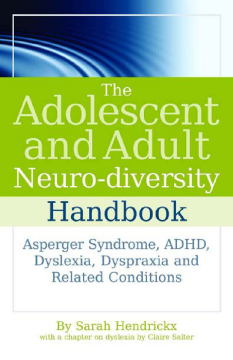
Additional Information
Book Details
Abstract
Increasing numbers of adults are realising that they have been living with an undiagnosed developmental condition, yet most information and support focuses on children. This leaves many adults confused and in the dark.
The Adolescent and Adult Neuro-Diversity Handbook is a handy first-reference point guide to the full range of developmental conditions as they affect adolescents and adults. Each chapter focuses on a different condition, describing its history, causes and characteristics, its implications for the individual, diagnosis and assessment, treatments and approaches, and strategies for providing support and self-support. A wide range of conditions are covered, including Autistic Spectrum Disorders, Dyslexia, Dyspraxia, ADHD, OCD, Tourette's and Anxiety Disorders.
The Adolescent and Adult Neuro-Diversity Handbook is an invaluable resource for health and social care practitioners, as well as for individuals who feel that they may be living with an undiagnosed developmental condition.
Sarah Hendrickx works as a freelance trainer and consultant in autistic spectrum conditions through her own consultancy, Hendrickx Associates. She provides professional training, Expert Witness and employment consultancy to organisations and coaching to individuals, families and couples. She is the author of several books on Asperger syndrome published by Jessica Kingsley Publishers as well as the co-author of Asperger Syndrome – A Love Story written with her partner Keith, who has been diagnosed with AS.
A book that does exactly what it says, covering the whole spectrum of neuro-diverse conditions: ADHD, ASD, dyslexia, dyspraxia, dyscalculia, Tourette's syndrome, and OCD. And importantly also covering dysgraphia and anxiety disorders, which are often overlooked...everything that's covered has, as ever with books by Hendrickx, been treated sensitively, openly, and with vignettes from people who have the conditions. It's good to see the neuro-diverse spectrum addressed by a single book, as professionals in the area often don't seem to understand the range of problems people have, nor that the same problems crop up for people with very different conditions. Thi final two chapters offer tips for anyone either in education or work (including seeking work), which (as well as being useful) show just how ordinary and simple the advice is. Organisations which bauld at providing adjustments for diverse people would learn how "special adaptation" are actually just best practice, if only we could get them to read the book!
Asperger United
Hendrickx addresses a lack of resources for the increasing numbers of adults being diagnosed in their 20s, 30s, and beyond, and provides a helpful overview for medical and teaching professionals, families and friends of the affect, and those unsure about the severity of their cognitive issues.
Publishers Weekly
